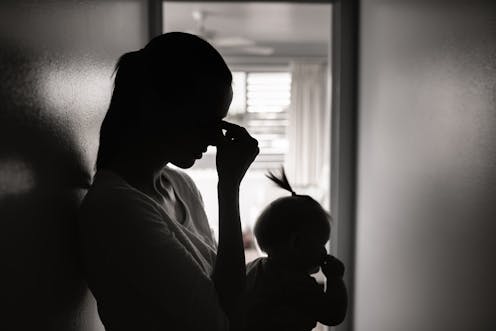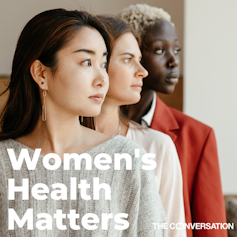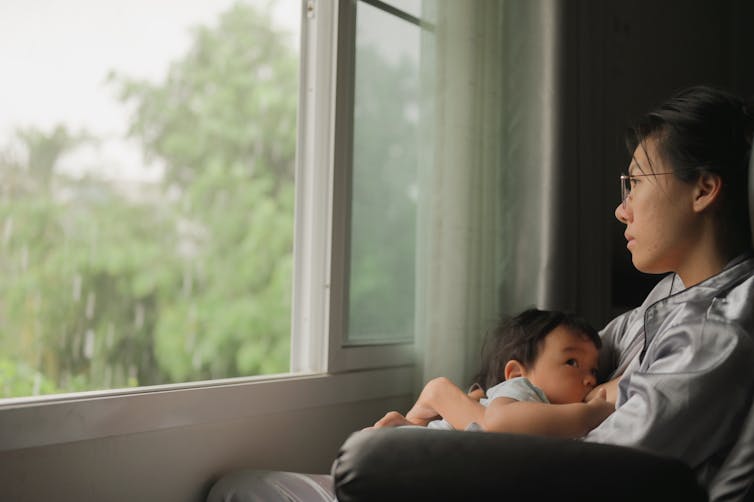
The past few years have seen more attention being paid to maternal mental health. Many people are now aware of conditions such as postnatal depression, which affects one in seven mothers.
But less is known about postnatal post-traumatic stress disorder (PTSD), also known as birth trauma – a severe mental health condition caused by the birth experience. It’s characterised by flashbacks, nightmares, depression and anxiety.
Up to 45% of women find some aspect of giving birth traumatic. But approximately one in 25 women develop postnatal PTSD.
Despite how common the condition is, many women – and even healthcare practitioners – are unaware of it. In fact, signs of birth trauma are sometimes mistaken for postnatal depression.

This article is part of Women’s Health Matters, a series about the health and wellbeing of women and girls around the world. From menopause to miscarriage, pleasure to pain the articles in this series will delve into the full spectrum of women’s health issues to provide valuable information, insights and resources for women of all ages.
You may be interested in:
Spain is the egg donation capital of Europe – here’s what it’s like to be a donor
‘Dirty red’: how periods have been stigmatised through history to the modern day
The orgasm gap and why women climax less than men
Even as a mental health researcher, I didn’t first hear about the condition until 2018, thanks to a research project featuring the stories of women who had overcome birth trauma.
I did not imagine that four years later I would be traumatised by my own birth experience. By sharing my story, I hope to bring greater awareness to postnatal PTSD and help more women get the care they need.
Traumatic birth
Birth trauma is typically triggered by the fear that you or your baby are going to die.
Many factors increase the risk of experiencing birth trauma – including long and painful deliveries requiring medical intervention (such as induced labour, an unplanned caesarean and deliveries using forceps).
Birth trauma can also happen after delivery. Needing treatment for heavy bleeding, your baby needing medical treatment and, understandably, experiencing a stillbirth, all increase risk of birth trauma.
Poor care is another factor, with research showing not being looked after properly, not being listened to, not being informed about your care and being treated without compassion and dignity can all lead to birth trauma.
I experienced many of these factors during my own birth.
While everything began as expected, my labour progressed slowly. After three days of labour, I was finally given an induction drip.
Despite having had an epidural, my contractions were agonising. Then, during labour, an unexpected gas leak meant I was evacuated from the labour ward. My baby was eventually delivered in theatre using forceps, with clinicians on stand-by to conduct a caesarean.
A week after birth, I was rushed to hospital after experiencing a secondary postpartum haemorrhage. I was separated from my son for 24 hours. During my recovery, my son was readmitted to hospital with an infection.
Although my entire birth experience was stressful, it was the uncompassionate way I was treated during labour and the days following that played a pivotal role in my resulting trauma.
Postnatal PTSD
In the months after giving birth, I had all the symptoms of postnatal PTSD. Not all women who experience a traumatic birth will develop PTSD. And while certain risk factors appear to increase its likelihood – such as poor social support and previous depression and trauma – it can happen to anyone.

I experienced flashbacks. Flashbacks of being wheeled hurriedly out of the labour ward during the gas leak, medical equipment balanced on me as we overtook a woman hobbling to safety with her newborn. Flashbacks of being lifted onto the operating table while screaming in agony, surrounded by hospital staff.
I had night terrors, where I would “wake” screaming, frantically searching for my son – convinced he was trapped in the duvet. My husband would try to reassure me – but even showing me our son didn’t help. When I came around, I felt disoriented, my chest heavy. I’d sit in silence soaked in sweat.
Avoiding reminders of birth has been impossible. I’ve had to revisit the hospital where I gave birth due to ongoing care. My newborn’s crying was a trigger – as was physical touch I hadn’t initiated. These caused me to have physical and emotional reactions and flashbacks.
The negative emotions I experienced in the year after my son’s birth were like nothing I’d experienced before. I didn’t know it was possible to feel such intense despair and anger, and to lose trust in and feel unsafe around even those closest to me.
My community midwife noticed I was struggling, and referred me to a specialist perinatal mental health team. A perinatal mental health nurse kept in regular contact with me and sought out relevant support.
I got to see a psychologist specialising in parent and infant bonding, who helped to grow my confidence as a mother and strengthen my relationship with my son. After our sessions together had ended, she assessed me for birth trauma. Due to my levels of trauma, I then had 12 weeks of trauma therapy, beginning just before my son’s first birthday. Only after this specialist support do I feel I am now recovering.
But sadly only 7% of women with maternal mental health symptoms get referred for specialist support in the UK. Specialist support isn’t provided in 11% of European countries.
Making improvements
While bringing greater awareness to birth trauma will help more women get the help they need, reducing actual incidences of traumatic births will require change to be made at all levels of care.
Improving the quality of maternal care is essential as not being listened to or treated with compassion are direct contributors to birth trauma. Addressing issues of underfunding, staff shortages, burnt-out staff and poor accountability in health systems will also help improve maternal care.
Income, disability, mental illness as well as race and ethnicity also impact the quality of maternity care women receive. Addressing these harmful biases is essential for reducing birth trauma.
These issues don’t have a quick fix. And neither does birth trauma.
I will forever be changed by my birth experience. I hope sharing my story will help women who may be struggling themselves.
If you, or anyone you know, is struggling with birth trauma, you can seek support through the Birth Trauma Association, or through your midwife, health visitor or GP.
Ceri Wilson does not work for, consult, own shares in or receive funding from any company or organisation that would benefit from this article, and has disclosed no relevant affiliations beyond their academic appointment.
This article was originally published on The Conversation. Read the original article.







